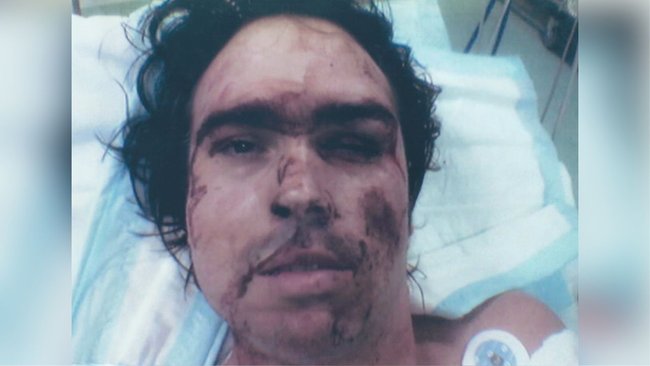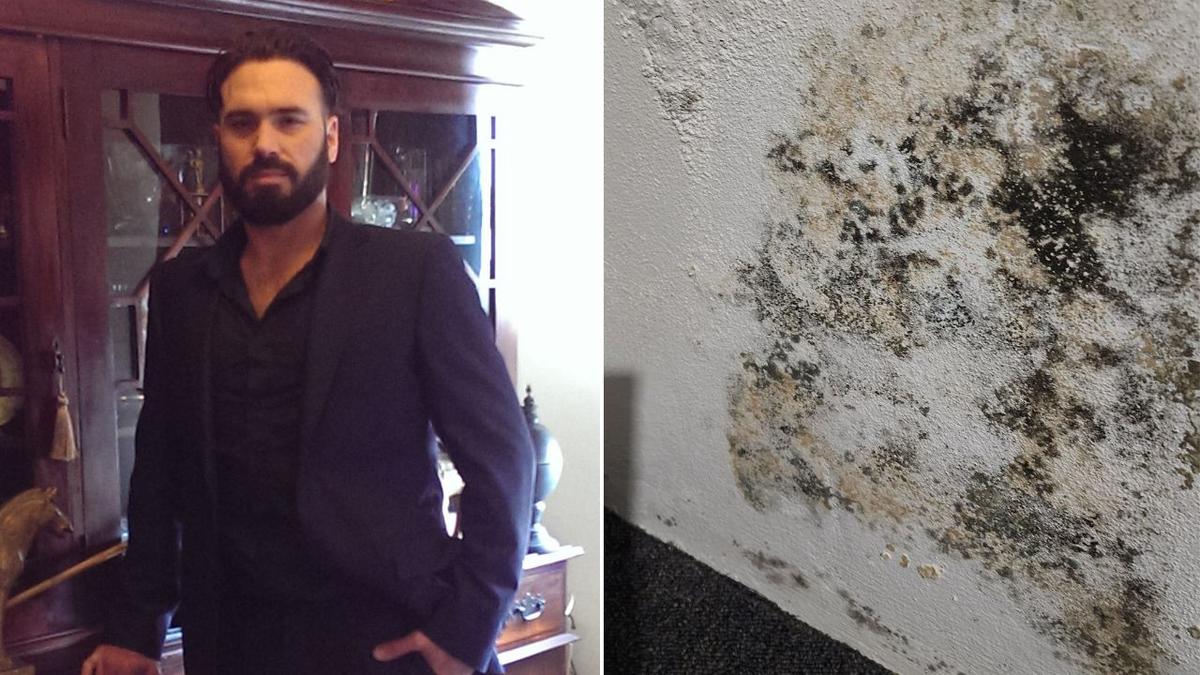A Sydney tenant living with disability has revealed the detriment public housing is having on his health.
He claims mould has been eating through his bedroom wall and into his furniture since May.
As he squelched through the constantly sodden carpet in his Redfern unit, fearful of what lay beneath, the foul smell it released offered a grim hint.
Know the news with the 7NEWS app: Download today
Black mould is harmful for anyone’s health but, as an immunocompromised tenant who lives with both respiratory and skin conditions, 45-year-old Justin Flemming told 7NEWS.com.au the months-long exposure has been anxiety-inducing.
“Every downfall of rain we get, I’m getting it inside the bedroom. You can see it seeping in through the wall and it’s completely saturating the carpet,” he said.
Asthma, and autoimmune conditions myositis and psoriasis, can all be exacerbated by mould — they are also among a long list of conditions that Flemming battles, and which Homes NSW has been made aware of.
NSW Health describes people like Flemming as being of the “greatest risk of health problems from contact with mould” and warns that the vulnerable demographic can also contract fungal infection of the lungs as a result.
 Justin Flemming said he has been reporting the mould problem in his bedroom since May. Credit: Supplied
Justin Flemming said he has been reporting the mould problem in his bedroom since May. Credit: Supplied
The department encourages people to reduce dampness in the home, as one strategy to avoid such an illness.
But Flemming said he tried countless times to have the damp issue fixed, and was never given a timeframe for a guaranteed fix until
A Homes NSW spokesperson told 7NEWS.com.au “an inspection earlier this month found no significant mould at the property”.
But since being contacted by 7NEWS.com.au, Homes NSW has sent someone to rip up the damp carpet, clean the mould underneath, and put in a work order in place to repair brickwork, clean gutters, check the roof, install a weather strip, and lay new carpet once the leak source is fixed.
“Homes NSW takes all maintenance concerns seriously and has been working closely with the tenant to resolve their issues since they were first reported,” Homes NSW said.
“All remaining repairs are on track to be completed by September 6, 2025.
“We will continue to keep the tenant informed and ensure the repairs are completed as quickly as possible.”
Tenants’ Union of NSW acting policy and advocacy manager Eloise Parrab told 7NEWS.com.au: “All renters should be safe in their homes. No one should have to worry about health hazards in their homes.
“It’s particularly worrying when we see populations vulnerable to sickness living with mould in dwellings and bedrooms.”
‘All renters should be safe’
Flemming is currently on strong antibiotics for a persistent chest infection which he said has “come about since the mould” — he’s aware that months-long courses of antibiotics can further reduce his immune defences.
Due to a compromised immune system, his body already struggles to “fight things off”. For him, a small, common infection can last for months and require painstaking attention.
“I was completely covered, for over a year, in a skin infection that was just resilient to antibiotics, and I had to take long medicated soap baths,” he said.
Despite multiple letters from his doctor to Homes NSW noting Flemming’s need of a bath to continue treatment, he still does not have access to a bath.
“(Doctors) have sent the Housing Commission several letters since February … they’ve said ‘this is what Justin NEEDS’ and they’ve put it in writing’,” he said.
“It’s the whole thing of equity and equality, treating someone as an individual and understanding what that specific person’s needs are. It’s important when looking at helping a person to move forward.”
A possible hot water system upgrade is under assessment, Homes NSW said.
7NEWS.com.au understands a transfer application has also been received by Homes NSW, but that transfers in a housing crisis take longer in high-demand areas or when disability modifications are required.
“Improving the quality of homes and the responsiveness from Homes NSW in responding to repairs is going to require investment and a commitment to the public benefit of a healthy public and community housing sector,” Parrab said.
As Flemming waits for a solutions, his skin condition, which “burns like stinging nettles”, has returned because he can no longer maintain the treatment routine he had.
“These are health conditions I’ve had in the past, but they’ve been exacerbated due to the mould and living conditions,” he said.
A series of unfortunate events
Flemming told 7NEWS.com.au he once had “a great life”.
“That’s over now.”
He recalled the moment his luck turned — he was walking home from Central Station after a shift at Crown Casino, where the then-28-year-old worked as a VIP host in 2007.
He had almost reached his house on Cleveland St when he “was hit really hard in the back of the head” in a violent robbery.
The knock caused a mild traumatic brain injury that left him with vomit-inducing migraines impacting his vision and speech, injured discs in his back and neck, and PTSD symptoms.
He said he had only just purchased a home on the Central Coast when the assault left him unable to work.
“I had to pull out of the sale,” he said, chalking up the timing to “Murphy’s Law”.
Then, in 2010, Flemming contracted spinal meningitis, which came with its own list of debilitating symptoms.
 Justin Flemming suffered mild traumatic brain injury when he was attacked while walking home from work in 2007. Credit: Supplied
Justin Flemming suffered mild traumatic brain injury when he was attacked while walking home from work in 2007. Credit: Supplied
Despite “every set back”, Flemming has refused to be defined by misfortune.
“I’ve had two major injuries in my life, and I’ve pushed through those with diligent maintenance so they would go unnoticed, so I could live my life and not have a health condition define or consume me,” he said.
“I have these injuries, I have these health conditions, they take a lot of my time and it consumes me to maintain them.”
But beneath the time-consuming routines is an improved quality of life, he said.
‘Caught up in a system’
A determined Flemming has known personal success despite his conditions, studying TAFE design courses, gaining experience through internships, and moving to the US where he worked until COVID hit.
But his conditions flared up upon his return to Australia and, no longer able to maintain employment, Flemming said the lack of income prompted a “constant fear”.
“It was just plaguing on me. It would keep me awake,” he said.
“I had no choice but to ask (Homes NSW), and I was grateful — I’d have taken anything, but I think that was a huge mistake.”
Flemming said he accepted a public housing unit “that may not have been exactly what I needed, because I didn’t want to be homeless, with the stress of all that I need to do”.
“In daily life we all have pressures but I think it’s important to respect that when you throw a spanner in the works, and suddenly have a bit more to do in life (to manage a disability), it really does make it harder.”
Living a life as he once did is important to Flemming, and he credits the meticulous maintenance of his conditions for having been able to do so.
It is only since entering the public housing system that he says this maintenance has become impossible to keep on top of.
“I see this as exactly how people get caught up in a system and never get ahead,” he said.
“This is why people don’t get out.
“I was literally almost in tears talking about this with my doctor, saying: I just want to get out. He said, ‘Look, you’re only in this situation, Justin, because of your injuries, because of the assault that happened years ago’.”
‘Fix what you can’
Throughout the months-long battle to have the mould and damp issue fixed, correspondence from Homes NSW has rarely come in writing, Flemming said.
“I’ve had to chase everything over the phone … I kept pleading with them, saying that my health is getting worse, I’ve been pleading since May, I’m getting sick,” he said.
“It was getting dismissed all the time.”
Many renters in public housing are facing prolonged waits for essential repairs, and receive temporary fixes that fail to address the root problems, Parrab said.
“This is exhausting for people who are already juggling many other things in their lives. Safe, secure housing is a human right, and poor housing affects all aspects of a person’s life,” Parrab said.
“All landlords in NSW including the government have an obligation under tenancy legislation to maintain premises in a reasonable state of repair.
“We encourage renters who are facing problems with repairs in their home to reach out to their local Tenants’ Advice and Advocacy Service for advice.”
There are other reasons why Flemming finds his public housing to be unsafe, but he has decided to focus on what can be fixed.
While moving into his public housing unit in January, Flemming, was assaulted by another tenant “right outside my building”.
The PTSD “flashbacks” that were persistent following his 2007 assault began to plague him again.
“My attitude to Housing was like, you can’t fix the flashbacks, so fix what you can fix — there’s water coming in, fix it — so that I can be left to maintain what I need to maintain,” he said.
“I don’t even like to mention my health conditions, because I like to move forward from it, but they are there, and they are always going to be there.
“It’s about living with, and maintaining, those injuries, and I don’t want to feel like I don’t have a voice.”
Thirty childcare centres put on notice for safety breaches
2 min read
Why the NDIS application process ‘can itself be disabling’
8 min read

